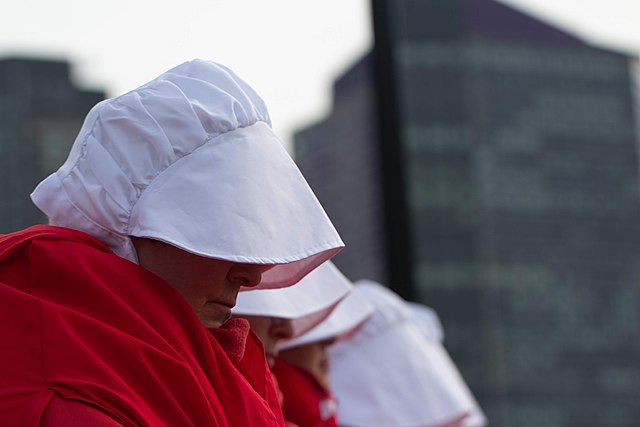As Margaret Atwood noted while discussing her dystopian novel, “There’s nothing in ‘The Handmaid’s Tale’ that didn’t happen, somewhere. If we are to learn just one thing from dystopian fiction, it’s to try and make sure not to let evil empires, dictatorships, or totalitarian states rise.”
We are failing.
The rise of authoritarianism in the UK now seems like an unstoppable force with the Tory party rushing to squeeze in as much as they can before they are removed from power while Labour parrot every vile policy the Tories come up with.
Drug testing women who have lost pregnancies to see if they have taken abortion pills, strip searching children, increasing surveillance in schools, arresting protestors, front page after front page telling us to hate, hate, hate those who need help.
This is the UK.
If we were to look abroad at a regime that engages in the activities currently being undertaken by the Tory government in power, and backed by the Labour Party as the government in waiting, the UK media would have no problem describing what they see as authoritarian or totalitarian states.
These states often employ extensive surveillance, suppress freedom of speech and assembly, and impose harsh restrictions on individual liberties under the pretext of maintaining order or social cohesion.
The next general election and the silencing of dissent
There is growing concern about what the Conservative Party could achieve by January 2025, the latest date they can call an election. But it’s not only the Tories that should be under scrutiny.
This week, we’ve seen the Conservative Party sack an MP for advocating for a ceasefire as Israel engages in a genocide in Gaza, while the Labour Party suspended an MP for calling for a peaceful resolution to the ‘conflict’.
The sacking of politicians for dissenting from party lines, especially on matters as critical as support for a country involved in a genocide when the majority of the UK public wants a ceasefire, reflects the disturbing, and increasing, intolerance within the UK’s political climate.
Are Labour and Tories indistinguishable?
Labour leader Keir Starmer seems to stand shoulder to shoulder with the Tories on most issues, offering little in the way of a contrasting vision or alternative policies.
This lack of differentiation blurs the lines between the government and the opposition, at a time when scrutiny and distinction are urgently needed.
Increasing surveillance and the criminalisation of dissent
An exclusive from the Guardian recently highlighted how the Metropolitan Police have been instructed to increase intelligence gathering in London schools in response to the War on Gaza.
While the Met argues that this is to improve safety, human rights groups warn that it could lead to the criminalisation of young people, particularly those from minority backgrounds.
Some might say that is the point.
This is part of a broader trend. The Runnymede Trust reported that almost 1,000 police officers operate in UK schools, with around half based in London.
This level of surveillance and the negative impact it could have on free speech and critical thinking in educational settings are cause for great concern.
Invasive policies and the attack on personal freedoms
Tortoise Media published another chilling exclusive, revealing that UK police are conducting tests for abortion drugs on women who have experienced unexplained pregnancy losses. They are even using data from menstrual tracking apps in their investigations.
Legal experts and healthcare providers have expressed concerns over these deeply intrusive practices and questioned the validity of consent.
Selective outrage and the media’s role
The media act as arbiters of public opinion, but their focus in the UK is glaringly selective. Some columnists have spent years arguing that trans people are a threat to society, yet remain conspicuously silent on issues that pose an immediate danger to democratic values and the safety of all women.
These same voices have preferred to criticise the Welsh government’s affirming stance on trans rights, while turning a blind eye to much larger threats to human rights and democracy.
Do any of them care about the ‘women and children’ they profess to want to protect being surveilled in these ways?
Not, it seems, if it gets in the way of them hating trans people.
All these elements point to authoritarianism, suppression of dissent, and violation of personal freedoms. The vilification of certain social groups based on nationality or gender identity is increasingly being used as a diversionary tactic, stirring up hate and fear.
This is not news to anyone who has been paying attention.
If we can learn one thing from dystopian fiction, it is that we should do everything in our power to prevent authoritarian states from rising. And for that, the first step is acknowledging that it is happening here.
It’s time to ask: What kind of society do we want to be?











